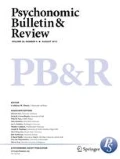Abstract
A hallmark of the experience of perceptual fluency is the sense that a familiar stimulus seems to pop out from its background, such as when one notices the face of a friend in a crowd of strangers. This experience suggests that fluency-based illusions of recognition memory may be more powerful when there are only a few fluent stimuli presented in a recognition context. The results of the present study were consistent with this prediction. The magnitude of fluency-based illusions of recognition memory was inversely related to the percentage of fluent stimuli on a recognition test. Furthermore, standard fluency manipulations did not impact recognition responses in between-participants designs. The results suggest that illusions of recognition memory may be more powerful when fluency is encountered in a context in which the surrounding stimuli are less fluent.
References
Bodner, G. E., & Masson, M. E. J. (2001). Prime validity affects masked repetition priming: Evidence for an episodic resource account of priming. Journal of Memory & Language, 45, 616–647.
Bodner, G. E., & Masson, M. E. J. (2004). Beyond binary judgments: Prime validity modulates masked repetition priming in the naming task. Memory & Cognition, 32, 1–11.
Brown, A. S. (2003). A review of the déjà vu experience. Psychological Bulletin, 129, 394–413.
Forster, K. I., Mohan, K., & Hector, J. (2003). The mechanics of masked priming. In S. Kinoshita & S. J. Lupker (Eds.), Masked priming: The state of the art. Hove, U.K.: Psychology Press.
Gellatly, A., Banton, P., & Woods, C. (1995). Salience and awareness in the Jacoby-Whitehouse effect. Journal of Experimental Psychology: Learning, Memory, & Cognition, 21, 1374–1379.
Goldinger, S. D., Kleider, H. M., & Shelley, E. (1999). The marriage of perception and memory: Creating two-way illusions with words and voices. Memory & Cognition, 27, 328–338.
Jacoby, L. L., & Dallas, M. (1981). On the relationship between autobiographical memory and perceptual learning. Journal of Experimental Psychology: General, 110, 306–340.
Jacoby, L. L., & Whitehouse, K. (1989). An illusion of memory: False recognition influenced by unconscious perception. Journal of Experimental Psychology: General, 118, 126–135.
Kurilla, B. P., & Westerman, D. L. (2008). Processing fluency affects subjective claims for recollection. Memory & Cognition, 36, 82–92.
Masson, M. E. J., & Caldwell, J. I. (1998). Conceptually driven encoding episodes create perceptual misattributions. Acta Psychologica, 98, 183–210.
Morris, C. D., Bransford, J. D., & Franks, J. J. (1977). Levels of processing versus transfer appropriate processing. Journal of Verbal Learning & Verbal Behavior, 16, 519–533.
Murrell, G. A., & Morton, J. (1974). Word recognition and morphemic structure. Journal of Experimental Psychology, 102, 963–968.
Reber, R., Zimmermann, T. D., & Wurtz, P. (2004). Judgments of duration, figure-ground contrast, and size for words and nonwords. Perception & Psychophysics, 66, 1105–1114.
Snodgrass, J. G., & Corwin, J. (1988). Pragmatics of measuring recognition memory: Applications to dementia and amnesia. Journal of Experimental Psychology: General, 117, 34–50.
Westerman, D. L., Lloyd, M. E., & Miller, J. K. (2002). The attribution of fluency in recognition memory: The role of expectation. Journal of Memory & Language, 47, 607–617.
Whittlesea, B. W. A., & Leboe, J. P. (2003). Two fluency heuristics (and how to tell them apart). Journal of Memory & Language, 49, 62–79.
Whittlesea, B. W. A., & Williams, L. D. (1998). Why do strangers feel familiar, but friends don’t? Acta Psychologica, 98, 141–165.
Whittlesea, B. W. A., & Williams, L. D. (2001a). The discrepancy attribution hypothesis: I. The heuristic basis of feelings and familiarity. Journal of Experimental Psychology: Learning, Memory, & Cognition, 27, 3–13.
Whittlesea, B. W. A., & Williams, L. D. (2001b). The discrepancy attribution hypothesis: II. Expectation, uncertainty, surprise, and feelings of familiarity. Journal of Experimental Psychology: Learning, Memory, & Cognition, 27, 14–33.
Wilson, M. (1988). MRC Psycholinguistic Database: Machine-usable dictionary, version 2.00. Behavior Research Methods, Instruments, & Computers, 20, 6–10.
Witherspoon, D., & Allan, L. G. (1985). The effect of a prior presentation on temporal judgments in a perceptual identification task. Memory & Cognition, 13, 101–111.
Yonelinas, A. P. (2002). The nature of recollection and familiarity: A review of 30 years of research. Journal of Memory & Language, 46, 441–517.
Author information
Authors and Affiliations
Corresponding author
Rights and permissions
About this article
Cite this article
Westerman, D.L. Relative fluency and illusions of recognition memory. Psychonomic Bulletin & Review 15, 1196–1200 (2008). https://doi.org/10.3758/PBR.15.6.1196
Received:
Accepted:
Published:
Issue Date:
DOI: https://doi.org/10.3758/PBR.15.6.1196

